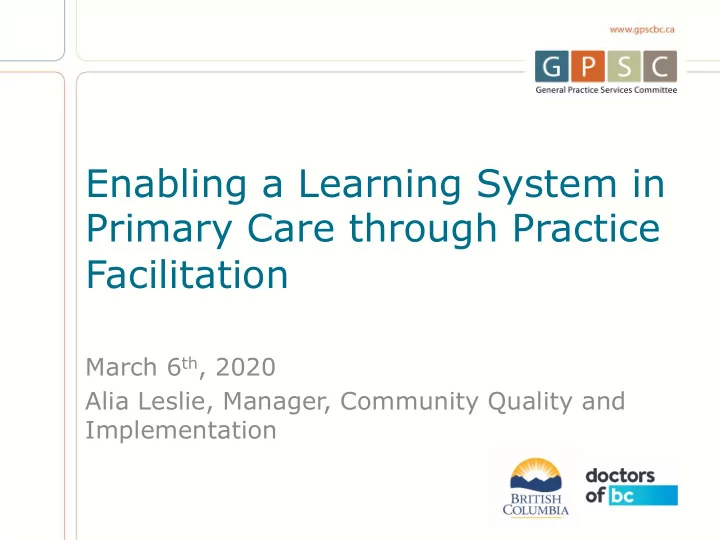

Enabling a Learning System in Primary Care through Practice Facilitation March 6 th , 2020 Alia Leslie, Manager, Community Quality and Implementation
Today’s Objectives § Provide a brief overview of the Practice Support Program in BC § Share an example of practice facilitation in primary care
GPSC’s Strategic Direction
What is PSP today? § A quality improvement program that focuses on building capacity in primary care practices and enabling proactive, data-informed care § Provincially housed tools and resources with local/community based in-practice coaching support
PSP Team: Coaches § 81.5 FTE coaches across BC § Established relationships with divisions of family practice and health authorities § Trusted by primary care providers and teams
PSP Team: Peers Mentors & Panel Assistants Peer • Physician and MOA peer mentors work side-by-side with PSP Coaches Mentors in the delivery of PSP services and supports . • Work as a member of a practice team Panel for a pre-determined period of time, laying the groundwork to build Assistants capacity in a family practice for ongoing panel management.
Practice Facilitation: Tailored In-Practice Supports
PSP Practice Facilitation Cycle
The PSP Toolbox
Practice Facilitation in the Real World – Reducing Workload and Wait-times
Stage 1 - Engage • Maintaining on-going relationship from Phases of Panel Management initiative and previous PSP participation
Stage 2 – Assess and Learn • EMR Functionality Assessment • Review of current processes (e.g. phone answering, appointment scheduling, team communication, visit preparation)
Stage 3 – Action Plan Aim statement : Dr. D will create • standardized processes related to office visits in collaboration with the MOA Lead and staff by June 21, 2019 Measures: • Patient wait time (baseline: 55min) – Visit time duration (baseline: 25 min) – Time spent doing paper work at home – (baseline: 2h) # of times going in and out of the visit – (baseline: 2-3x/visit)
Stage 4 – Test and Measure • Change ideas tested: – 10 min huddle between Dr. D and MOA to prep for following day – Distributing patient education letter – New follow-up appointment booking process – Developed a visit type and prep document
Test and Measure cont. Measure Pre Post Avg patient 55 min 20 min wait time Avg visit time 25 min 15 min duration Paperwork 2h 1.5h time # times going 2-3x/visit 0-1x/visit in and out
Stage 5 - Implement Refined and standardized change • ideas Outcomes: • Dr. D is leaving work on time and doing less – paperwork at home MOA feels valued and clear on their roles and – expectations Patients are happier with reduced wait times – Overall team morale and communication has – improved
Stage 6 - Sustain • Celebrated successes • Discussed approaches to sustain work • Booked future check-ins with PSP to explore future projects – E.g. patient experience, PMH Assessment
Questions
Thank You! psp@doctorsofbc.ca www.pspbc.ca
Recommend
More recommend